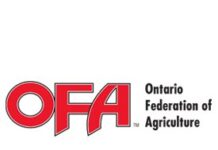by Mark Reusser, Vice President, Ontario Federation of Agriculture
The quote, “You can’t pour from an empty cup,” may resonate with farmers who are currently dealing with mental health struggles. The Ontario Federation of Agriculture (OFA) understands how the pressure of keeping up with everyday responsibilities, along with the stressors of navigating a pandemic, can become taxing and overwhelming. Mental health is like a scale – balancing back and forth from mild to severe. Somewhere along the spectrum the weight becomes too much to handle and the ability for a person to properly take care of themselves is lost. Once someone is unable to care for their own personal wellbeing, they have little to give to others.
As farmers, we not only have families to take care of, but many of us have livestock to care for too. Oftentimes, when mental illness begins to take a toll on us, it creates a ripple effect that impacts many of our roles and responsibilities. Once the disease becomes crippling, a farmer may lose their motivation to get up in the morning, complete everyday tasks and neglect their livestock as a result.
However, we cannot place blame on these individuals. Mental health is an illness, and just like a physical ailment, it impacts our day to day life and abilities. During COVID 19, the reduced human interaction and increase in stress and pressure to maintain the farm business has resulted in an influx of mental health crises within the farming community. Through conversations with people in the agriculture community over the past year, it’s evident that mental health has also been associated with animal welfare cases. The inability to care for the health and welfare of livestock can be the unfortunate result of someone suffering with mental health issues.
We care deeply about the health and wellbeing of our animals. Each day, we dedicate countless hours to ensure they’re well fed, healthy and living in clean environments. As a livestock producer, it has always been in my best interest to raise healthy, nurtured and well cared for livestock. The reality is our animals are our livelihoods. Not only do we care for these animals, but they are the key to maintaining a profitable farm business. As livestock farmers, we care about the health, safety, welfare and comfort of our animals and follow established national codes of practice for their care and handling. Although research on this topic is still ongoing, studies show animal welfare can be directly linked to human welfare. To put it simply, many of us lose the ability to care for another living being after we’ve lost the ability to care for ourselves.
Signs of mental health struggles that could result in animal welfare issues include a farmer’s inability to maintain the cleanliness of their barn, less frequent trips to care for their livestock, or sudden changes in the condition of their barn. If you notice any of these signs among your friends or neighbours, please reach out and check in on them.
As the conversation about mental health continues to evolve, we recognize many farmers have become more perceptive at recognizing the signs of struggle and more open to taking preventative measures. However, even those who appear to be functioning normally need to be checked on, supported and made to feel like they matter. Mental health can be crippling and the best way to get through it is together.
The Provincial Animal Welfare Services Act (PAWS) Advisory Committee, which was established by the Ontario government and includes OFA Vice President Drew Spoelstra, recognizes the link between mental health and caring for animals. OFA will continue to ensure mental health and the connection to on farm livestock management is a priority for the committee. Enforcement through PAWS on animal welfare issues can assist a farmer dealing with a mental health crisis. Enforcement officers are well equipped and properly trained to handle issues of mental health and animal welfare. They have the skills to assess the situation and determine the best course of action for the animals or livestock.
As individuals, we have a responsibility to report suspected animal welfare issues. However, please remember to remain compassionate in times of crisis. Our farmers who are proud of the care they provide their animals. In a mental health crisis, it’s the unintentional acts and inabilities to care for others that can affect livestock. As a community, it’s important to proceed with care and compassion to help our neighbours when they’re in need of our support.
If you or someone you know is in distress and needs help, there are people and resources available. Please reach out for 24/7 support by calling the Ontario Mental Health Line at ConnexOntario. Reach them at 1 866 531 2600, or use their online chat function. For additional resources, visit the ConnexOntario website, or ofa.on.ca/mental-health.


